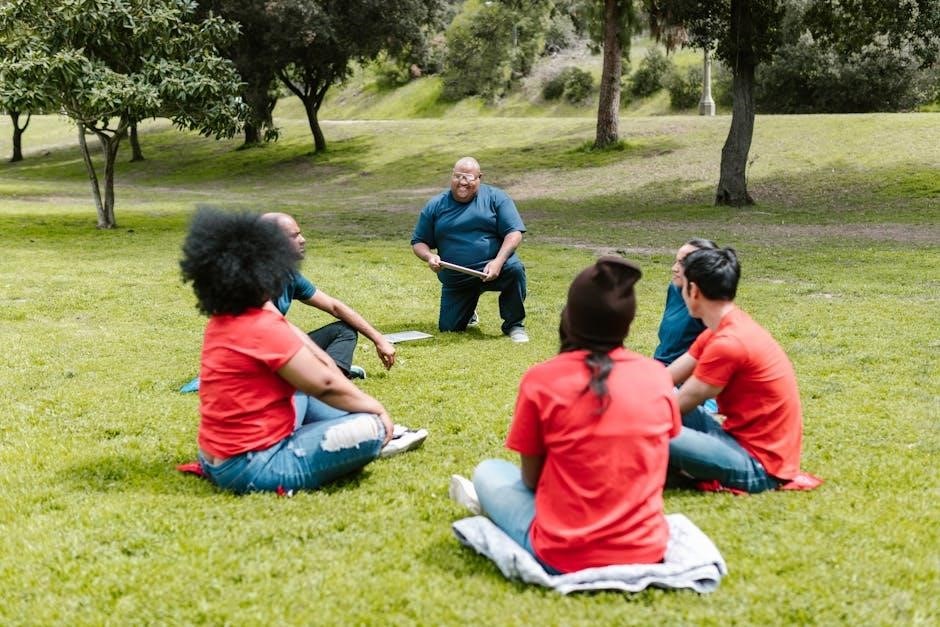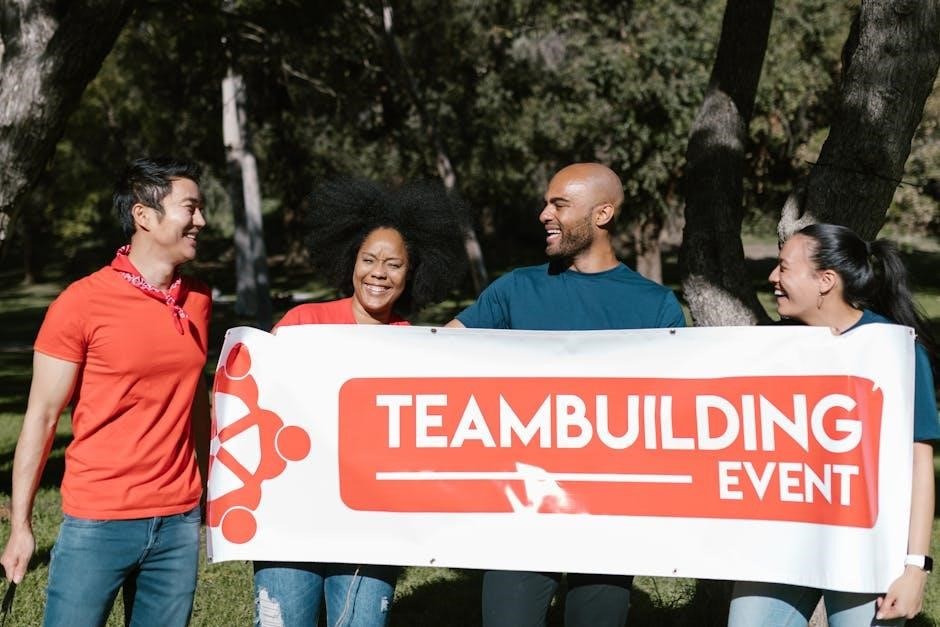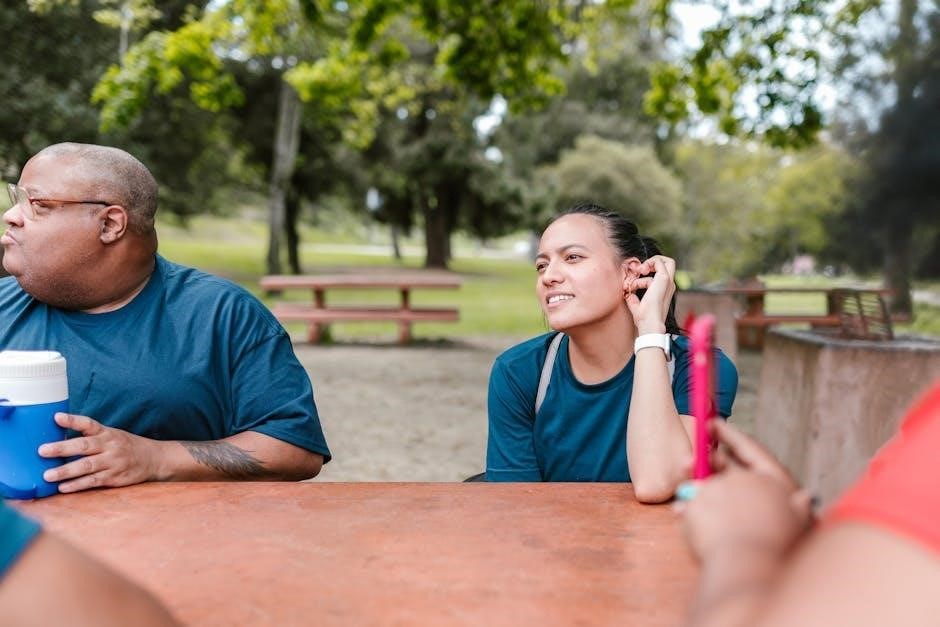Leadership training activities are essential for developing strong leaders․ They offer practical exercises, downloadable PDF guides, and interactive experiences to enhance leadership skills and team collaboration effectively․
1․1 Importance of Leadership Development
Leadership development is crucial for fostering effective communication, decision-making, and problem-solving skills․ It empowers individuals to inspire and guide teams, driving organizational success․ By enhancing self-awareness and emotional intelligence, leadership development prepares individuals for future challenges․ It also promotes collaboration, adaptability, and innovation, essential for sustainable growth․ Investing in leadership development fosters stronger communities and equips leaders to address real-world issues confidently․ Through structured activities and resources, leadership development cultivates the next generation of leaders, ensuring they are prepared to make a meaningful impact․
1․2 Overview of Leadership Training Activities
Leadership training activities encompass a wide range of exercises designed to enhance leadership skills․ These include problem-solving challenges, communication games, and team-building exercises․ Activities are tailored for individuals and groups, promoting self-reflection and collaboration․ Resources like downloadable PDF guides, templates, and activity lists provide structured approaches․ Many exercises focus on real-world scenarios, enabling participants to apply leadership concepts practically․ Whether through interactive games or reflective tasks, these activities foster personal growth and equip leaders with tools to inspire and motivate others effectively․

Types of Leadership Training Activities
Leadership training activities include individual exercises like reflection and self-assessment, and group activities such as team games and problem-solving challenges to foster personal growth and teamwork․
2․1 Individual Leadership Development Exercises
Individual leadership development exercises focus on personal growth and self-assessment․ Activities like self-reflection, journaling, and vision board creation help individuals identify strengths and areas for improvement․ Available in PDF formats, these exercises often include downloadable templates and guides to support independent learning․ By engaging in these exercises, participants can deepen their understanding of leadership traits and align their personal goals with leadership aspirations․ These resources provide a structured yet flexible approach to developing essential leadership skills on an individual level․
2․2 Group Leadership Activities and Team-Building Games
Group leadership activities and team-building games are designed to foster collaboration and communication․ Games like “Hog Call” and “Peek-a-Who” encourage participants to work together, enhancing their leadership qualities․ These activities, often detailed in downloadable PDF guides, promote problem-solving, trust, and shared responsibility․ By engaging in these exercises, individuals learn to lead effectively within a team dynamic, developing essential interpersonal and organizational skills․ These group exercises are a fun and interactive way to build stronger, more cohesive teams and cultivate future leaders․

Leadership Training Resources in PDF Format
Downloadable PDF resources offer templates, guides, and handouts to support leadership development activities, providing structured tools for facilitators and participants to enhance their leadership skills effectively․
3․1 Downloadable Templates and Handouts for Leadership Development
Downloadable templates and handouts in PDF format provide structured tools for leadership development․ These resources, such as Handout 3․1, offer practical exercises and guides for facilitators and participants․ They include activity lists, worksheets, and job aids that support interactive learning․ Templates are designed to enhance leadership skills through structured exercises and real-world applications․ Facilitators can access these materials to create engaging sessions, while participants benefit from clear, actionable content․ These PDF resources are ideal for both individual and group activities, ensuring a comprehensive approach to leadership growth and development․
3․2 SI Leader Training Guides and Activity Lists
SI Leader Training Guides and activity lists are valuable resources for structuring effective leadership sessions․ These guides, available in PDF format, provide detailed instructions for facilitating activities and managing groups․ They include tools like Strategy Cards and attendance tracking methods using Excel․ Designed for both new and experienced leaders, these resources offer a comprehensive approach to skill development․ The activity lists cover a range of exercises, from problem-solving to team-building, ensuring diverse learning opportunities․ These guides are essential for creating engaging and impactful leadership development programs, making them a go-to resource for trainers and facilitators alike․
Experiential Learning Activities
Experiential learning engages participants in hands-on activities like problem-solving exercises, decision-making challenges, and real-world case studies․ These interactive experiences foster leadership growth through practical application and reflection, enhancing critical skills effectively․
4․1 Problem-Solving and Decision-Making Exercises
Problem-solving and decision-making exercises are vital for leadership development․ These activities, often presented in PDF guides, include puzzles, simulations, and real-world case studies․ Participants engage in critical thinking, analyzing challenges, and creating actionable solutions․ Such exercises enhance strategic planning, adaptability, and confidence․ They are designed to replicate real-life scenarios, allowing leaders to practice decision-making under pressure․ These interactive tools foster collaboration and innovation, equipping individuals with the skills to navigate complex situations effectively․ By addressing diverse problems, participants develop a robust approach to leadership and problem-solving, preparing them for future challenges․
4․2 Case Studies and Real-World Scenarios for Leadership Development
Case studies and real-world scenarios are powerful tools for leadership development․ They provide practical insights into handling complex situations, fostering critical thinking and adaptability․ These exercises, often found in PDF guides, present authentic challenges, enabling participants to apply leadership concepts to real-life problems․ By analyzing case studies, individuals develop decision-making and problem-solving skills, learning to navigate ethical dilemmas and organizational conflicts․ Real-world scenarios also encourage collaboration, helping leaders understand diverse perspectives and implement effective solutions․ These activities bridge theory and practice, preparing leaders to address challenges confidently and strategically in their professional environments․

Leadership Styles and Stereotypes
Leadership styles and stereotypes are explored through activities that identify and challenge traditional traits, fostering inclusive leadership and encouraging diverse approaches to decision-making and team management․
5․1 Exploring Leadership Traits for Men and Women
Activities such as brainstorming stereotypes for leadership traits using sticky labels help identify and challenge traditional gender roles․ Participants list characteristics for men and women, fostering discussions on inclusive leadership․ These exercises encourage understanding of diverse leadership approaches and promote gender-neutral perspectives․ By exploring these traits, individuals gain insight into how stereotypes influence leadership perceptions and behaviors․ This activity supports the development of inclusive leadership styles, emphasizing the importance of diversity in effective team management and decision-making processes․
5․2 Breaking Stereotypes in Leadership
Leadership training activities often include exercises designed to challenge traditional gender stereotypes․ These exercises encourage participants to question and redefine their perceptions of leadership traits․ By engaging in open discussions and role-playing scenarios, individuals can explore how stereotypes limit leadership potential․ This helps create a more inclusive environment where diverse leadership styles are valued․ Breaking stereotypes fosters collaboration and innovation, allowing teams to thrive under varied perspectives․ Such activities are crucial for developing modern, adaptive leaders who embrace diversity and equity in their approaches․
Skill Development Through Activities
Leadership training activities enhance essential skills like communication and decision-making․ Interactive exercises and downloadable PDF guides provide practical experiences, fostering confident and effective leaders through hands-on learning․
6․1 Communication Skills Enhancement
Effective communication is a cornerstone of leadership․ Leadership training activities, such as brainstorming sessions and interactive games like “Peek-a-Who,” enhance verbal and non-verbal communication․ Participants engage in exercises that promote active listening, clarity, and confidence in expressing ideas․ These activities, often detailed in downloadable PDF guides, foster collaboration and teamwork while refining interpersonal skills․ By practicing these techniques, individuals develop the ability to convey messages clearly and build strong connections with their teams, essential for successful leadership in real-world scenarios․
6․2 Building Confidence and Decision-Making Abilities
Confidence and decision-making are vital for effective leadership․ Leadership training activities, such as group discussions and problem-solving exercises, help individuals develop these skills․ Through guided challenges, participants learn to trust their judgment and make informed decisions․ Downloadable PDF resources provide structured frameworks to practice these abilities․ These activities foster self-assurance and critical thinking, enabling leaders to navigate complex situations with clarity and determination․ By mastering decision-making, individuals become more assertive and capable of guiding their teams toward shared goals successfully․
Games and Fun Activities for Leadership Learning
Leadership learning becomes engaging with fun activities like “Hog Call” and “Peek-a-Who․” These interactive games enhance communication, trust, and teamwork while making training enjoyable and effective․
7․1 “Hog Call” and Other Interactive Games
“Hog Call” and similar interactive games are dynamic tools for leadership learning․ These activities foster teamwork, communication, and problem-solving in a fun, engaging environment․ Participants face challenges that encourage collaboration and trust, enhancing their leadership abilities; Games like “Hog Call” involve physical movement and creative thinking, making them memorable and impactful․ They are often used in training sessions to break the ice and create a relaxed atmosphere for learning․ These exercises are designed to be enjoyable while promoting essential leadership skills and camaraderie among team members․ They are perfect for making leadership development an exciting experience․
7․2 “Peek-a-Who” and Laughter-Based Learning Reinforcers
“Peek-a-Who” is a fun, laughter-based activity designed to engage participants and reinforce leadership concepts․ Using simple props like a blanket or sheet, participants play a game that encourages creativity and teamwork․ This activity creates a relaxed atmosphere, fostering connection and collaboration among team members․ Laughter-based learning reinforcers like “Peek-a-Who” help break the ice, making complex leadership ideas more accessible and memorable․ These light-hearted exercises are effective in reducing tension and promoting a positive environment for skill development and group bonding․ They ensure leadership training remains enjoyable while impactful․

Community and Team Impact
Leadership training activities promote community and team impact by fostering sustainable environments and stronger family bonds, utilizing PDF resources for effective skill development and collaboration․
8․1 Leadership Activities for Sustainable Communities
Leadership activities for sustainable communities focus on fostering collaboration and responsibility among individuals․ These exercises often involve problem-solving, community service projects, and interactive learning experiences․ By engaging in such activities, participants develop skills to address local challenges and promote environmental awareness․ Downloadable PDF guides provide structured frameworks for organizing these initiatives, ensuring accessibility and practical implementation․ These activities not only strengthen community bonds but also empower individuals to drive positive change․ They emphasize the importance of collective effort in creating and maintaining sustainable environments, ensuring long-term benefits for future generations․
8․2 Building Stronger Families Through Leadership Development
Leadership development activities strengthen family bonds by fostering communication, mutual respect, and shared responsibility․ These exercises often involve collaborative problem-solving and decision-making processes․ Parents and children can engage in tailored activities designed to enhance emotional intelligence and empathy․ Downloadable PDF guides offer practical tools and exercises for families to practice leadership skills together․ By fostering a supportive environment, these activities help family members become better leaders within their households, promoting harmony and resilience․ Stronger families, in turn, contribute to healthier communities and societies․
